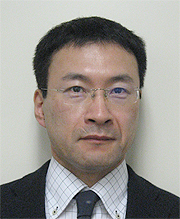FROM PROF
 Hiroaki Adachi graduated Nagoya University School of Medicine with a Medical Doctor degree in 1991. As a recipient of a doctor's degree, he pursued combined M.D. - Ph.D. training at the Nagoya University Graduate School of Medicine. His doctoral thesis research focused upon a neurodegenerative disease known as spinal and bulbar muscular atrophy (SBMA) or Kennedy's disease. SBMA was first described in a paper entitled, “Progressive bulbar palsy”, in 1897 by Prof. Kawahara in Japan. The underlying genetic abnormality was determined to be abnormal expansion of a CAG repeat in the androgen receptor (AR) gene. While a graduate student, he made the model mouse of SBMA. This model recapitulated not only the neurologic disorder but also the phenotypic difference with gender which is a specific feature of SBMA. Mice that expressed AR with 97 CAG repeats (AR-97Q) exhibited progressive motor impairment, while none of the mice that expressed AR with 24 CAG repeats (AR-24Q) showed abnormal phenotypes. The AR-97Q mice demonstrated small body size, short life span, progressive muscle atrophy, and weakness as well as reduced cage activity, all of which were markedly pronounced and accelerated in the male AR-97Q mice, but were either not observed or far less severe in the female AR-97Q mice. The dramatic gender difference of phenotypes led us to attempt hormonal interventions as a treatment for SBMA. Successful treatment of AR-97Q mice with anti-androgen therapies led them to perform testosterone blockade therapies in SBMA patients. A trial on a larger scale is currently underway to verify the clinical benefits of leuprorelin in SBMA patients. After completing his M.D. - Ph.D. training in 2002, Dr. Adachi pursued postdoctoral fellowship training at the Department of Neurology, Nagoya University Graduate School of Medicine, continuing to focus upon neurodegenerative disease. He was a designated lecturer from 2007-2011, and a designated associate professor from 2012-2013 in the Nagoya University Graduate School of Medicine.
Hiroaki Adachi graduated Nagoya University School of Medicine with a Medical Doctor degree in 1991. As a recipient of a doctor's degree, he pursued combined M.D. - Ph.D. training at the Nagoya University Graduate School of Medicine. His doctoral thesis research focused upon a neurodegenerative disease known as spinal and bulbar muscular atrophy (SBMA) or Kennedy's disease. SBMA was first described in a paper entitled, “Progressive bulbar palsy”, in 1897 by Prof. Kawahara in Japan. The underlying genetic abnormality was determined to be abnormal expansion of a CAG repeat in the androgen receptor (AR) gene. While a graduate student, he made the model mouse of SBMA. This model recapitulated not only the neurologic disorder but also the phenotypic difference with gender which is a specific feature of SBMA. Mice that expressed AR with 97 CAG repeats (AR-97Q) exhibited progressive motor impairment, while none of the mice that expressed AR with 24 CAG repeats (AR-24Q) showed abnormal phenotypes. The AR-97Q mice demonstrated small body size, short life span, progressive muscle atrophy, and weakness as well as reduced cage activity, all of which were markedly pronounced and accelerated in the male AR-97Q mice, but were either not observed or far less severe in the female AR-97Q mice. The dramatic gender difference of phenotypes led us to attempt hormonal interventions as a treatment for SBMA. Successful treatment of AR-97Q mice with anti-androgen therapies led them to perform testosterone blockade therapies in SBMA patients. A trial on a larger scale is currently underway to verify the clinical benefits of leuprorelin in SBMA patients. After completing his M.D. - Ph.D. training in 2002, Dr. Adachi pursued postdoctoral fellowship training at the Department of Neurology, Nagoya University Graduate School of Medicine, continuing to focus upon neurodegenerative disease. He was a designated lecturer from 2007-2011, and a designated associate professor from 2012-2013 in the Nagoya University Graduate School of Medicine.
Dr. Adachi's research laboratory remains focused upon the molecular basis of neurodegenerative, epileptic, neuroinflammatory and psychosomatic diseases. Dr. Adachi's laboratory is attempting to understand the molecular events that underlie the processes of neurodegeneration, neuronal cell death in SBMA, amyotrophic lateral sclerosis (ALS), multiple system atrophy (MSA), Parkinson’s disease and Altzheimer’s disease, and he also focuses on the molecular basis of epileptic, neuroinflammatory and psychosomatic diseases. He attempts to develop therapies to treat these disorders based on the mechanistic knowledge by reproducing molecular pathology in model animals such as mice and rats. In his laboratory, he applies the tools of molecular genetics, neuroscience, and functional genomics to understand the basis of neural function and to identify mechanisms of these diseases. He is interested in manipulation of protein quality control, because it is now clear that nervous system and skeletal muscle are susceptible to accumulation of misfolded proteins. We study the roles of molecular chaperones, ubiquitin proteasome system, and autophagy. Our goal is to unveil mechanisms by which neurons become dysfunctional or die, and use this knowledge to develop disease-modifying therapies.
